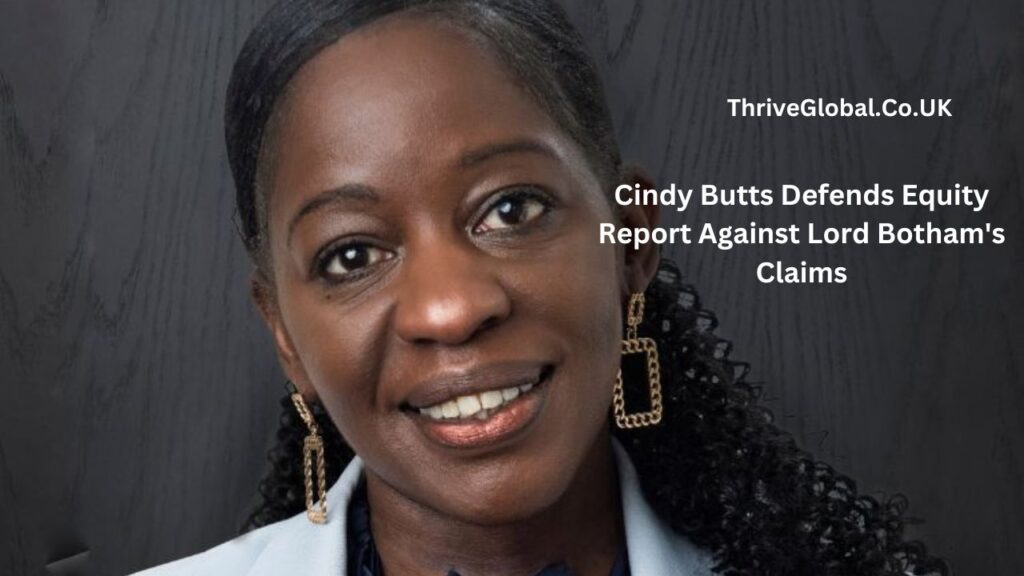In the latest showdown of perspectives, Cindy Butts staunchly defends an Equity Report amidst fervent opposition from Lord Botham. The clash, reminiscent of David versus Goliath, pits Butts, a champion of fairness and inclusivity, against the formidable stature of Lord Botham, emblematic of traditionalist views.
Butts, armed with a wealth of data and a steadfast commitment to justice, stands firm against the onslaught of critiques, steadfastly defending the report’s findings. As the debate unfolds, it becomes a riveting spectacle, drawing attention to the complexities of equity in contemporary society and igniting discussions that resonate far beyond the confines of the courtroom.
Table of Contents
ToggleBackground Information
The equity report under scrutiny was commissioned to investigate and address disparities in various sectors of society, including education, employment, and healthcare. Its primary goal was to identify systemic inequalities and propose actionable recommendations to create a more just and inclusive society. Given the current global focus on social justice and equality, this report was both timely and crucial.
Cindy Butts: A Brief Biography
Cindy Butts is a well-known figure in the field of social justice and equity. With a rich career dedicated to advocating for the rights of marginalized communities. She has held various influential positions that underscore her commitment to fairness. Butts has served on multiple boards and commissions. Bringing a wealth of experience and a strong voice to the equity report. Her role in the report highlights her expertise and unwavering dedication to creating positive societal changes.
Also Read: 02045996870: A Number with a Story
Lord Botham: A Brief Biography
Lord Ian Botham, famously known for his illustrious cricket career, has also made a name for himself as an outspoken commentator on social and political issues. His criticisms of the equity report are rooted in his belief that it is biased and fails to provide a balanced perspective.
Botham’s stature and influence have added significant weight to his claims, making this controversy particularly prominent.
The Equity Report
The equity report presented several key findings and made comprehensive recommendations to address systemic inequalities. It highlighted disparities in various sectors and stressed the need for institutional reforms. Some of the key findings included:
- Education: Significant gaps in access to quality education among different socio-economic groups.
- Employment: Disparities in job opportunities and wage gaps between different demographic groups.
- Healthcare: Inequitable access to healthcare services, leading to poorer health outcomes for certain communities.
The report recommended policy changes, increased funding for marginalized communities, and stronger enforcement of anti-discrimination laws to address these issues.
Lord Botham’s Claims
Lord Botham has been vocal in his criticisms of the equity report, arguing that it is flawed and biased. His main points of contention include:
- Methodology: Botham claims that the report’s methodology is flawed, arguing that it selectively uses data to support a predetermined narrative.
- Data Interpretation: He believes that the data has been interpreted in a way that exaggerates disparities and fails to consider other contributing factors.
- Recommendations: Botham argues that the proposed solutions are impractical and could have unintended negative consequences.
He has called for a more balanced and objective analysis of the issues at hand, suggesting that the report’s findings should be re-evaluated.
Cindy Butts’ Defense
In defense of the equity report, Cindy Butts has presented several counterarguments. She emphasizes the rigorous and transparent process behind the report, which involved consultations with a wide range of stakeholders and experts. Key points in her defense include:
- Comprehensive Research: Butts highlights the extensive research and data collection efforts that underpin the report, arguing that it provides a thorough and accurate representation of systemic inequalities.
- Diverse Perspectives: She points out that the report incorporated a wide range of voices, including those from marginalized communities, ensuring a balanced and inclusive perspective.
- Evidence-Based Recommendations: Butts argues that the report’s recommendations are grounded in evidence and are necessary to address the identified disparities effectively.
By addressing specific criticisms with detailed explanations and supporting evidence, Butts aims to demonstrate the report’s validity and importance.
Public and Political Reactions
The controversy has elicited varied reactions from the public and political figures. Many have voiced their support for Cindy Butts and the equity report, praising its thoroughness and the need for systemic change. However, others align with Lord Botham’s criticisms, arguing that the report is biased and unbalanced. This divide highlights the polarized nature of discussions around equity and fairness.
Media Coverage
Media coverage has played a crucial role in shaping public opinion on this issue. Different media outlets have portrayed the controversy in various lights. Some have focused on the legitimacy and importance of the equity report, while others have highlighted Lord Botham’s criticisms, emphasizing the need for a balanced perspective. This diverse media coverage has contributed to the complexity of the public’s perception and the broader debate on equity.
Expert Opinions
Experts in social justice, data analysis, and public policy have weighed in on the debate, largely supporting the validity of the equity report. They emphasize the comprehensive research and methodological rigor that underpin the findings. Arguing that the report provides a crucial roadmap for addressing systemic inequalities.
Some experts have also pointed out that criticisms like those from Lord Botham are not uncommon and can serve as important checks to ensure the robustness of such reports.
Impact of the Controversy
In the short term, the controversy has heightened awareness about issues of equity and fairness, bringing them to the forefront of public discourse. In the long term, the debate could influence policy decisions and the implementation of the report’s recommendations.
The controversy underscores the importance of evidence-based approaches to social justice and the need for ongoing dialogue and engagement with diverse perspectives.
Lessons Learned
This controversy offers several lessons about the challenges of addressing equity and fairness. It highlights the need for robust methodologies and transparent processes in creating such reports. Additionally, it shows the importance of engaging with and addressing criticisms constructively. By fostering an open and inclusive dialogue, stakeholders can work together to create meaningful and lasting change.
Cindy Butts’ Vision for the Future
Looking forward, Cindy Butts remains optimistic about the potential for positive change. She advocates for continued efforts to implement the report’s recommendations and stresses the importance of ongoing dialogue and collaboration. Butts believes that by working together and maintaining a focus on evidence-based solutions, society can make significant strides toward greater equity and fairness.
Conclusion
In conclusion, the debate between Cindy Butts and Lord Botham over the equity report is a significant moment in the ongoing struggle for fairness and justice. While criticisms and defenses abound, the core message of the report remains clear. Systemic change is necessary for a more equitable society.
This controversy serves as a reminder of the complexities involved in addressing deep-rooted inequalities. And the importance of commitment and perseverance in the pursuit of justice.
Also Read: Read Blue Lock Chapters and Enjoy, Coming Soon
FAQs
- What was the main focus of the equity report?
- The equity report aimed to identify systemic disparities across various sectors. And propose actionable solutions to promote fairness and inclusivity.
- How did Cindy Butts respond to Lord Botham’s claims?
- Cindy Butts defended the report by highlighting the rigorous process and diverse perspectives involved in its creation, and provided evidence to counteract specific criticisms.
- What are the implications of the equity report?
- The report’s implications include potential policy changes. A greater emphasis on addressing systemic inequalities in areas such as education, employment, and healthcare.
- How has the public reacted to the controversy?
- Public reactions have been mixed, with some supporting Lord Botham’s criticisms while others back Cindy Butts and the findings of the equity report.
- What can be learned from this situation?
- This situation underscores the need for thorough, transparent processes in creating equity reports. The importance of engaging with criticisms constructively to foster meaningful change.



